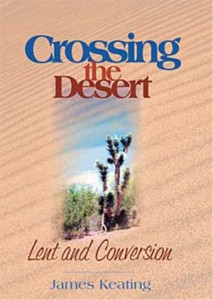Podcast: Play in new window | Download (Duration: 31:50 — 22.0MB) | Embed
Subscribe: Apple Podcasts | Spotify | Amazon Music | Android | Pandora | iHeartRadio | JioSaavn | Podchaser | Gaana | Podcast Index | Email | TuneIn | Deezer | Anghami | RSS | More

The Oasis of Lent – Crossing the Desert: Lent and Conversion with Deacon James Keating
Deacon James Keating and Kris McGregor discuss various aspects of marriage, spirituality, and the role of Christ in relationships. Life is a continuous response to God’s love, with the ultimate fulfillment found in heaven.
While perfection may not be attainable, continual growth in yielding to Christ leads to spiritual improvement over time.
Discerning Hearts Reflection Questions
- Understanding Continuous Growth: How does Deacon Keating describe the concept of life as a continual response to God’s love? What does he emphasize regarding the attainment of perfection?
- Perfectionism in Relationships: What are the dangers associated with perfectionism in relationships, according to Deacon Keating? How does he suggest overcoming these challenges through spirituality and prayer?
- Importance of Intercessory Prayer: Why does Deacon Keating underscore the significance of intercessory prayer within marriage? How does he envision spouses supporting each other’s spiritual development?
- Sacramental Marriage as a Vocation: What parallels does Deacon Keating draw between sacramental marriage and Christ’s sacrificial love on the cross? How does he advocate for thorough spiritual preparation for marriage?
- Prioritizing Relationship with God: According to Deacon Keating, why is it essential for couples to prioritize their relationship with God in marriage? How does he emphasize the transformative potential of Christ’s love in relationships?
 An excerpt from “Crossing the Desert: Lent and Conversion”:
An excerpt from “Crossing the Desert: Lent and Conversion”:
“Moral conversion occurs in ordinary experience when we hit a wall or break through one. In other words, moral conversion can be ignited when we reach our limits and experience failure or finitude, or it can be ushered in when we transcend our limits and go beyond the self. We transcend the self by falling in love and/ or following the prompting of conscience at the cost of our own ego.
The traditional disciplines of Lent— prayer, fasting, and almsgiving, as well as communal worship— aim at fostering or preparing a person to welcome such limiting or breakthrough experiences. Most importantly, we are prepared to receive the truths known in these experiences, since we can rarely, if ever, orchestrate them. More than likely, we are taken up into such experiences, and our preparation beforehand can enhance our acceptance of the truths they carry.
(In regards to communal worship) …We usually imagine worship as a break in our secular lives, or sometimes even an obstacle to achieving other goals. With this attitude, worship is sometimes simply seen as “time out” from what is really important. Without denying the importance of secular realities for the laity, could we look at worship in another way? Worship is not an obstacle to daily living; it is not time off from more vital realities. Worship is, in fact, the great doorway into all that is both secular and holy. It is our way into real living. In worship, we find the great integration of the simple, ordinary, and plain (people, bread, wine, words) with the holy and transcendent (paschal mystery, incarnation, grace, transformation, salvation). The call of the laity is to carry into each day of work and domestic commitment the truth that the ordinary and the holy are not opposed. Only sin and the holy are opposed. Lenten worship services help us bring this truth to the world.
The more we come to see the presence of Christ in worship as a presence that permeates our being in the world, the more we will hunger to participate in worship as the source of our moral witness in everyday life. The Eucharist primarily is our participation in Christ’s Paschal Mystery, which is his self-offering to the Father, both in his life and upon the cross, and is also the Father’s response in raising him from the dead. Christ came to us; he came to dwell upon Earth and take on created goodness so that all in creation that is not good (sin) may be transformed by his presence, by grace. We too, in communion with him through the grace of the sacramental life, fill the ordinary world with his presence and become witnesses to this salvation through virtue and grace cooperating in moral activity.”
Deacon James Keating, Ph.D., is a professor of Spiritual Theology and serves as a spiritual director at Kenrick Glennon Seminary in St. Louis, MO.

